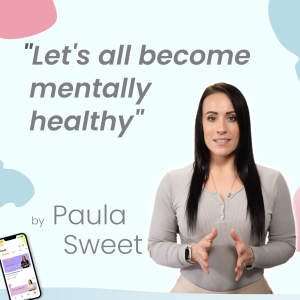
Becoming Mentally Healthy by Paula Sweet at Absolute Mind
Health & Fitness:Mental Health

This is episode 143 of the Absolute Mind podcasts and today I am covering Misophonia
This was another request from the Facebook audience so thank you so much appointment through and allowing me to create content that will hopefully help you in some way.
http://www.absolutemind.co.uk/freeanxietycourse
Please do bear in mind that we have created this podcast to be of some insight and some sort of assistance but by no means a way to treat conditions on their own.
If you do have any deep-rooted conditions or ailments that you'd like some assistance with on a one-to-one professional approach, then please feel free to contact either myself or Michael on Facebook or directly through the website and we can arrange sessions that way or via Skype, whatever suits.
So let's get to Misophonia, what is it and how can you deal with it?
The very fact you are listening to this podcast means that you should have an awareness of what misophonia is or may have heard about it in some way.
What Is Misophonia?
The definition of misophonia is somebody who hates sounds, but not necessarily all sounds. People who suffer from misophonia have triggers and specific sounds that they find hard to deal with and are sensitive to only certain sounds.
Now there are probably sounds that we all find hard such as fingernails down a chalk board, or squeaking of a balloon, but this is only a fraction of what a sufferer will experience when they hear their specific trigger sound. sufferers can experience an intense strong negative emotion towards their trigger sound and in some cases can create an urge to lash out at the thing or person creating that sound.
What Are Triggers?
There are many different trigger sounds but here are a select few that I have found:
Eating, loud chewing, burping, crunching, gulping, chewing gum, licking, throat clearing, breathing, nasal, grunting, sniffling, sneezing, raspy voices, nose whistling, wheezing, nasally voice, keyboard tapping, clocks, tv remote, pen clicking, papers rustling, feet shuffling.
This is just a select few that i have seen and heard of but there are many many more!
How Can You Overcome Misophonia?
It is said that techniques such as CBT can help with overcoming Misophonia, allowing you to react differently to trigger noises and rationalise your response more effectively. Noticing how your thoughts create intense feelings and changing those thoughts.
Hypnosis can also be a great tool to help you to overcome this issue.
Remember I am not a GP so cannot diagnose and the details in this podcast are ideas and tips that i have used with clients to help and aid them in their progress, if you are unsure or need to have any issues diagnosed please do visit your GP or talk to a professional on a 1-2-1 basis.
More Episodes
 2020-01-15
2020-01-15
 2018-11-19
2018-11-19
 2018-10-11
2018-10-11
 2018-10-09
2018-10-09
 2018-10-05
2018-10-05
 2018-10-04
2018-10-04
 2018-10-02
2018-10-02
 2018-10-01
2018-10-01
 2018-09-28
2018-09-28
 2018-09-27
2018-09-27
 2018-09-25
2018-09-25
 2018-02-20
2018-02-20
 2018-02-20
2018-02-20
 2018-02-19
2018-02-19
 2018-02-13
2018-02-13
 2018-02-08
2018-02-08
 2018-02-05
2018-02-05
 2018-01-30
2018-01-30
Create your
podcast in
minutes
- Full-featured podcast site
- Unlimited storage and bandwidth
- Comprehensive podcast stats
- Distribute to Apple Podcasts, Spotify, and more
- Make money with your podcast
It is Free
- Privacy Policy
- Cookie Policy
- Terms of Use
- Consent Preferences
- Copyright © 2015-2024 Podbean.com



